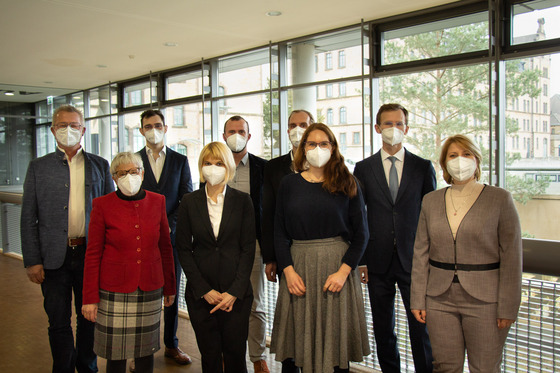Diverschance_East – Global competence development and diversity challenges in an innovative Europe
News
Days of Ukraine in Lower Saxony
While Ukraine is present in the media in an unpleasant way on a daily basis, it is less in the public awareness that numerous Ukrainians have been living and working in Germany for many years. As a result, several German-Ukrainian networks have already been developed in the past. Even independently of the Ukrainians living in Germany, there was cooperation between researchers in Germany and Ukraine before the recent war.
A project team led by Prof. Petia Genkova, who conducts research in the field of cultural psychology at the "Competence Center Global Competence" (Faculty of Business Management and Social Sciences), had established a research network before the current war, which includes researchers in several countries in Central and Eastern Europe. This network was formed as the core of the project "Diverschance_East - Global competence development and diversity challenges in an innovative Europe" and deals with the opportunities arising from a diversifying Europe. As a result of the exchange within this network, a researcher from Ukraine is currently spending a research stay at Osnabrück University of Applied Sciences.
The project team was recently invited to the conference "Days of Ukraine in Lower Saxony", which took place on 30.09.2022 and 01.10.2022 at Leibniz University Hannover. The conference is organized in cooperation with the German-Ukrainian Academic Society and the Hannover Medial School. It serves to promote and to further expand German-Ukrainian university cooperation and research cooperation.
On the first day of the conference, Ukrainian and German researchers presented their projects. On behalf of the project team, Jonathan Herbst reported on various international and national projects being carried out at the Competence Center Global Competence. He provided detailed insights into the project "Diverschance_East", in the framework of which Dr. Liudmyla Smokova from the National Mechnikov University Odesa is currently conducting research at the Osnabrück University of Applied Sciences.
Between the lecture sessions, the Ukrainian speakers introduced their educational institutions. Refugee researchers reported on their activities in the Lower Saxony host institutions. The project team was able to establish contacts with other researchers who are potential cooperation partners for future projects.
As expected, the current war in Ukraine also played a central role at this year's conference. Some speakers reported on how the war is hindering scientific work, but also on how cooperation projects between German and Ukrainian universities could provide quick and targeted help. The conference also provided space for German-Ukrainian aid organisations to present their activities.
Of current practical relevance was a programme item during which specific problems of refugee Ukrainian researchers were discussed through group work and solutions were sought. Jonathan Herbst was able to share his experience of working with refugees and his theoretical knowledge of refugee and integration research. The project team was also able to establish further contacts with NGOs and associations that could be important future partners in the field of refugee and integration research and research into intercultural competence.
The event was rounded off by a doctoral competition and by Ukrainian musicians, who provided a festive closing atmosphere.
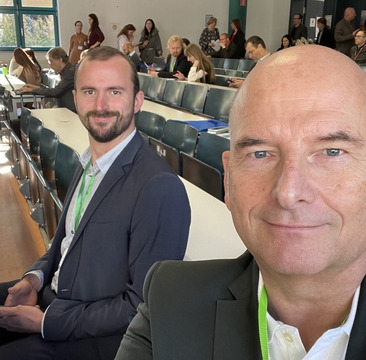
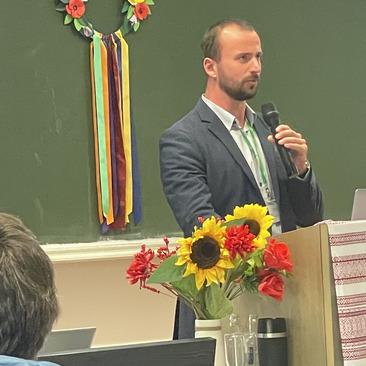
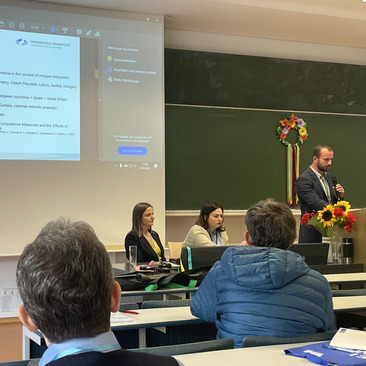
Workshops
From September 18th to 21st 2023, the second workshop in the DiversChance_East project took place in Osnabrück.
The following professors from various European countries and different academic disciplines took part.
Prof. Dr. Vasily Popkov, Professor of Political Science, Odessa Mechnikov National University
Prof. Dr. Yevhen Plotnikov, Professor of Psychology, Nizhyn Gogol State University
Prof. Dr. Rosina Shevchenko, Professor of Psychology, Odessa National Maritime University
Prof. Dr. Victor Pakhmurnyy, Professor of Medical Sciences, Odessa National Maritime University
Prof. Dr. Tetiana Kryvosheia, Professor of Sociology, Odessa Mechnikov National University
Prof. Dr. Filip Majetić, Researcher in Sociology and Entrepreneurship, Ivo Pilar Institute of Social Sciences
Prof. Dr. Eva van Belle, Professor of Economics, Vrije Universiteit Brussel
Prof. Dr. Fátima Barbosa, Professor of Sociology, Universidade do Minho
Prof. Dr. Dorothy Olsen, Research Professor, Nordic Institute for Studies in Innovation
Prof. Dr. Mauro Romanelli, Professor of Organisation and Human Resource Management, University of Napoli Parthenope
The workshop agenda included the presentation of the current research of the Competence Centre Global Competence and the introduction of the participating institutions and universities by their representatives.
The Competence Centre Global Competence was represented by Henrik Schreiber, who presented past and current projects. In addition to the presentation of DiversChance_East, this included the projects Cult-Open, Accept and Utilize Diversity (DNA), Ready for a Colourful World, EduChance, Investigation on Ukrainian Refugees, Cost: Work Inequalities in later life, Fair Future, PDM: Diversity management for Universities and Cult Euro 1: Intercultural Competence. Regarding the joint Horizon EU application, the Horizon EU framework and the selected call were also presented.
Prof. Dr. Vasily Popkov presented the structures of the Odessa Mechnikov National University. Furthermore, he showed historical and systemic explanations for developments in the EU through the political science approaches of Systems Analysis and the Clash of Civilization. He concluded his lecture with the words “Research is not about the sunset but the sunrise of Europe”.
Prof. Dr. Yevhen Plotnikov presented the Nizhyn Gogol State University and relevant projects of the university's psychological center and projects related to Erasmus+. Among others, these were projects on the health of teachers and students in times of war or on psychological stability in the context of trauma-focused therapeutic measures.
Prof. Dr. Rosina Shevchenko presented the main activities of the Department of Practical Psychology of the Odessa National Maritime University in her presentation entitled “Main areas of work and training of practical psychologists”. These activities can be divided into the fields of pedagogical psychology, medical psychology, military psychology and psychology of adaptation. For each of the fields, current projects were presented.
Prof. Dr. Victor Pakhmurnyy from the Odessa National Maritime University gave a lecture entitled “Civil self-organisation as a way of influencing the mental state residents of Odessa in anticipation of hostilities”. The aim of the study was to investigate the mental changes of people who were not directly in hostile areas but were under stress factors. The study showed that stabilization of the emotional state and the general level of adaptation is more successful when those affected are among like-minded people and engage in physical activities.
Prof. Dr. Tetiana Kryvosheia presented the Odessa Mechnikov National University and various projects. Among others, the projects included removing barriers for human contacts between Ukraine and the EU through liberalization of visa and border regime and sociological research on determination of existing processes of work with social conflicts in Odessa.
Prof. Dr. Filip Majetić presented the Ivo Pilar Institute of Social Sciences as well as past and present research projects. Such projects targeted, among other things, labor insecurity in the gig economy or the improvement of technological and entrepreneurial skills in social organizations.
Prof. Dr. Eva van Belle presented the Vrije Universiteit Brussel and its research team as well as current research on Wage Gaps, with explanations by migration status, motherhood and perceptions of fairness in a meta-analysis. She also presented findings on discrimination in recruitment through the use of eye-tracking when reviewing CVs.
Prof. Dr. Fátima Barbosa presented the Universidade do Minho as well as her professional career including her projects. Her research areas include older caregivers, home care and other health fields. Among other things, she showed that co-residential caregivers are a socially, economically and health disadvantaged group, whereas extra-residential caregivers are a socially, economically and health advantaged group. Moreover, home care in Portugal is associated with depressive symptoms.
Prof. Dr. Dorothy Olsen presented the Nordic Institute for Studies in Innovation. Her research topics include competences and lifelong learning, vocational education, research system, higher education, innovation, diversity and equality, and school and kindergarten. She highlighted different theoretical approaches to interdisciplinary learning, including practice-based perspectives on developing shared practices and communication theories aiming at shared understanding.
Prof. Dr. Mauro Romanelli introduced the University of Napoli Parthenope and presented results on how cities become inclusive communities by developing policies for migrants. He addressed the aspects of international and European frameworks for inclusive and sustainable cities, cities as inclusive and sustainable urban communities, cities as inclusive communities encountering migrants and the way to integrate migrants into European urban communities.
After the presentation of institutions and universities, a group work was carried out to identify possible common research perspectives. At the same time, various possibilities for future cooperation were discussed. The participants are willing to take part in the Cult Open study as well as to discuss Erasmus contracts between the universities. The Cult Open study aims to explore attitudes towards diversity, migration, intercultural competence, promotion of a European identity and reduction of discrimination, determining both culture-specific and cross-cultural aspects.
Furthermore, possibilities for the design of the Horizon EU application and for increasing the impact on the societal level were discussed. Through project work in several groups, results were collected for different sectors, such as education, politics and labor market. The groups also identified relevant stakeholders and competences to be taken into account in the sectors.
During the project work and the presentation, there was a lively exchange of thoughts, questions and new concepts, which made the workshop a catalyst for innovation. The exchange of ideas was diverse and interdisciplinary, and there was a harmonious interaction. This workshop emphasizes the unifying role of science and research in fostering social cohesion and international exchange, thus strengthening cooperation within Europe.
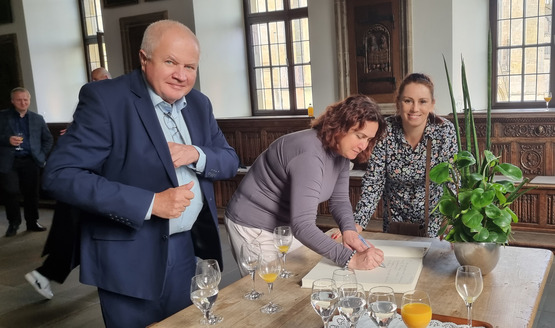
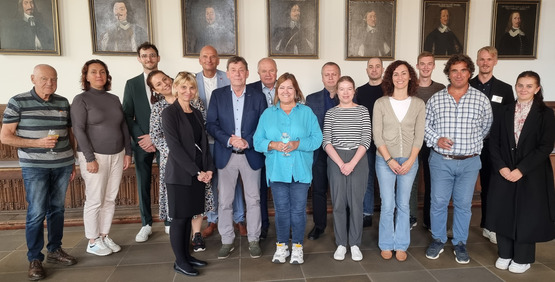
From 08.02.2022 to 11.02.2022, a hybrid workshop took place at the Osnabrück University of Applied Sciences as part of the DiversChance-East project. Representatives from Ukraine, Hungary, Lithuania, Spain and Germany came together to develop a new research project to explore the topic of diversity in an even more interdisciplinary way in the future.
During the four-day workshop, the representatives dealt intensively with the topics of diversity, inclusion and the reduction of discrimination in the workplace.
At the beginning of the workshop, the participants were first welcomed to the city of Osnabrück and given a tour of the city. After the welcome on the campus of the university by the vice president of the Osnabrück University of Applied Sciences, Prof. Dr. Lehmann, a campus tour followed.
Afterwards, each participant presented himself and his own research. This was followed by a professional discussion in the plenum. Here, the participants devoted themselves to the jointly planned research project and put together ideas for implementation in order to benefit from each other in the best possible way.
With the help of the workshop, a joint research outline was developed based on the different focuses of the contributors in the ongoing DiversChance-East project. The central idea is to reduce discrimination in the workplace based on certain characteristics such as age, gender or cultural background.
Over the next few months, the network will devote itself to actively exchanging research and ideas, with a view to then jointly submitting a European research proposal.
The aim of the project is to contribute to conflict-free intercultural communication and to ensure greater fairness and understanding.
Planned cooperation in follow-up projects
In the future, the project partners will be integrated into the CULT_OPEN network. This inclusion will create multiple opportunities for further cooperation. Through the expansion of cross-sectoral cooperation, it will also be possible to work together with representatives of the local economy in both Western and Eastern Europe. Thus, on the one hand, the transfer of scientific results into practice will be advanced. On the other hand, innovative potential and synergy effects in science and economy can be developed.
Planned expansion of cooperation to other institutions and networks
The bilateral cooperation of the project partners will be integrated into the Cult_Open network. The network consists of experts from the fields of diversity, intercultural competence, and migration. The incorporation facilitates the expansion of the network by including the Ukraine. In addition, further perspectives can be incorporated into the research on global competence, thereby enabling research proposals to be submitted in the current and upcoming EU research framework programs. The cooperation with the CULT_OPEN network also suggests an expansion of the interorganizational relations of the participating universities in addition to the cooperation of the participating project partners. Through partnerships, local science systems can be modernized and strengthened, benefiting the promotion of young scientists. Furthermore, barriers for Erasmus students can be lowered, thus facilitating intercultural exchange already among students.
